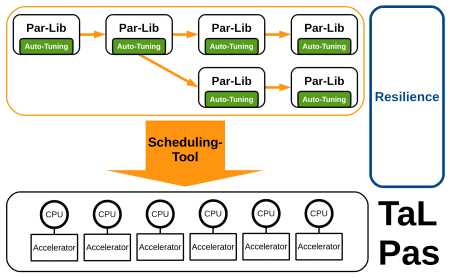Table of Contents
TaLPas
Coordinators
Prof. Dr. Philipp Neumann, Helmut-Schmidt-Universität Hamburg
Prof. Dr. Hans-Joachim Bungartz, Technische Universität München
Funded Partners
TaLPas (Task-basierte Lastverteilung und Auto-Tuning in der Partikelsimulation) is a three-year project (01/2017 - 12/2019). It is funded by the Federal Ministry of Education and Research (BMBF; call “Grundlagenorientierte Forschung für HPC-Software im Hoch- und Höchstleistungsrechnen”, grant number 01IH16008). The consortium of TaLPas consists of seven partners:

Prof. Dr. Philipp Neumann, Helmut-Schmidt-Universität Hamburg
Prof. Dr. Thomas Ludwig, Universität Hamburg
Prof Dr. Hans-Joachim Bungartz, Nikola Tchipev, Fabio Gratl, Steffen Seckler, Technische Universität München
Dr. José Gracia, Christoph Niethammer, Nils Urmersbach, HLRS/Universität Stuttgart
Dr. Guido Reina, Oliver Fernandes, Patrick Gralka, VISUS/Universität Stuttgart
Prof. Dr. Felix Wolf, Sebastian Rinke, Sergei Shudler, Technische Universität Darmstadt
Jun.-Prof. Dr. Kai Langenbach, Dr. Truong Vo, Technische Universität Kaiserslautern
Prof. Dr. Jadran Vrabec, Matthias Heinen, Technische Universität Berlin
Objectives
 With the approaching exascale era, HPC architectures undergo radical changes. The increase in compute cores per processor/node and the rise of exascale hardware require “MPI+X” programming approaches. Fault-tolerant approaches need to account for hard- and software failures at exascale. Optimal exploitation of respective supercomputers becomes more and more important, due to the high energy consumption of these huge systems. These and many other issues pose challenges for the programmers and the users of respective soft- and hardware. In particular, the usual tuning approach
With the approaching exascale era, HPC architectures undergo radical changes. The increase in compute cores per processor/node and the rise of exascale hardware require “MPI+X” programming approaches. Fault-tolerant approaches need to account for hard- and software failures at exascale. Optimal exploitation of respective supercomputers becomes more and more important, due to the high energy consumption of these huge systems. These and many other issues pose challenges for the programmers and the users of respective soft- and hardware. In particular, the usual tuning approach
- Choose an optimal algorithm; go to 2
- Optimize at node-level; investigate performance and pot. revise 1,2; go to 3
- Optimize at distributed memory level; investigate performance and pot. revise 1,2,3; go to 4
- Optimal software solution found
becomes very complex.
In this regard, the project TaLPas: Task-basierte Lastverteilung und Auto-Tuning in der Partikelsimulation targets an auto-tuning and task-based approach to high-performance particle simulations. Particle simulations are used in a wide range of problem settings such as molecular dynamics, fluid dynamics, or astrophysics.
The main goal of TaLPas is to provide a solution to fast and robust simulation of many, potentially dependent particle systems in a distributed environment.
This is required in many applications, including, but not limited to,
- sampling in molecular dynamics: so-called “rare events”, e.g. droplet formation, require a multitude of molecular dynamics simulations to investigate the actual conditions of phase transition,
- uncertainty quantification: various simulations are performed using different parametrizations to investigate the sensitivity of the parameters on the actual solution,
- parameter identification: given, e.g., a set of experimental data and a molecular model, an optimal set of model parameters needs to be found to fit the model to the experiment.
For this purpose, TaLPas targets
- the development of innovative auto-tuning based particle simulation software in form of an open-source library to leverage optimal node-level performance. This will guarantee an optimal time-to-solution for small- to mid-sized particle simulations,
- the development of a scalable task scheduler to yield an optimal distribution of potentially dependent simulation tasks on available HPC compute resources,
- the combination of both auto-tuning based particle simulation and scalable task scheduler, augmented by an approach to resilience. This will guarantee robust, that is fault-tolerant, sampling evaluations on peta- and future exascale platforms.
Contact
Prof. Dr. Philipp Neumann, philipp.neumann@hsu-hh.de
Publications
M. Horsch, C. Niethammer, G. Boccardo, P. Carbone, S. Chiacchiera, M. Chiricotto, J. Elliott, V. Lobaskin, P. Neumann, P. Schiffels, M. Seaton, I. Todorov, J. Vrabec, W. Cavalcanti. Semantic interoperability and characterization of data provenance in computational molecular engineering. Accepted for publication in Journal of Chemical & Engineering Data, 2019
T. Rau, P. Gralka, O. Fernandes, G. Reina, S. Frey, T. Ertl. The impact of work distribution on in situ visualization: a case study. ISAV '19 Proceedings of the Workshop on In Situ Infrastructures for Enabling Extreme-Scale Analysis and Visualization, pp. 17-22, 2019
O. Fernandes, S. Frey, G. Reina, T. Ertl. Visual Representation of Region Transitions in Multi-dimensional Parameter Spaces. Accepted for Smart Tools and Apps for Graphics - Eurographics Italian Chapter Conference, 2019
S. Seckler, F. Gratl, N. Tchipev, M. Heinen, J. Vrabec, H.-J. Bungartz, P. Neumann. Load Balancing and Auto-Tuning for Heterogeneous Particle Systems using ls1 mardyn. Accepted for publication in High Performance Computing in Science and Engineering '19, 2019
S. Stephan, M.T. Horsch, J. Vrabec, H. Hasse. MolMod - an open access database of force fields for molecular simulations of fluids. Molecular Simulation 45(10):806-814, 2019
S. Stephan, M. Thol, J. Vrabec, H. Hasse. Thermophysical Properties of the Lennard-Jones Fluid: Database and Data Assessment. Journal of Chemical Information and Modeling 59:4248-4265, 2019
P. Neumann. Sparse Grid Regression for Performance Prediction Using High-Dimensional Run Time Data. Accepted for publication in Euro-Par 2019: Parallel Processing Workshops, 2019
F. Gratl, S. Seckler, N. Tchipev, H.-J. Bungartz, P. Neumann. AutoPas: Auto-Tuning for Particle Simulations. Accepted for workshop iWAPT at IPDPS, 2019
P. Neumann, N. Tchipev, S. Seckler, M. Heinen, J. Vrabec, H.-J. Bungartz. PetaFLOP Molecular Dynamics for Engineering Applications. High Performance Computing in Science and Engineering '18, pp. 397-407, 2019
N. Tchipev, S. Seckler, M. Heinen, J. Vrabec, F. Gratl, M. Horsch, M. Bernreuther, C.W. Glass, C. Niethammer, N. Hammer, B. Krischok, M. Resch, D. Kranzlmüller, H. Hasse, H.-J. Bungartz, P. Neumann. TweTriS: Twenty Trillion-atom Simulation. Accepted for publication in International Journal of High Performance Computing Applications, 2018
S. Shudler, J. Vrabec, F. Wolf. Understanding the Scalability of Molecular Simulation using Empirical Performance Modeling. Accepted for publication at the workshop for extreme-scale programming tools (ESPT) at SC18, 2018
E.J. Garcia, D. Bhandary, M.T. Horsch, H. Hasse. A molecular dynamics simulation scenario for studying solvent-mediated interactions of polymers and application to thermoresponse of poly(N-isopropylacrylamide) in water. Journal of Molecular Liquids, in press, 2018.
M.K. Ilyas, A. Calotoiu, F. Wolf. Off-Road Performance Modeling – How to Deal with Segmented Data. Euro-Par 2017: Parallel Processing, pp. 36-48, 2017
P. Reisert, A. Calotoiu, S. Shudler, F. Wolf. Following the Blind Seer – Creating Better Performance Models Using Less Information. Euro-Par 2017: Parallel Processing, pp. 106-118, 2017
Talks and Posters
P. Neumann et al. TaLPas: Task-Based Load Balancing and Auto-Tuning in Particle Simulations. Gauß-Allianz HPC-Status-Konferenz, Paderborn, 2019
S. Seckler et al. Load Balancing and Auto-Tuning for Heterogeneous Particle Systems using ls1 mardyn. HLRS Results and Review Workshop, Stuttgart, 2019
P. Neumann. Sparse Grid Regression for Performance Prediction Using High-Dimensional Run Time Data. Euro-Par 2019: Parallel Processing Workshops (iWAPT), 2019
P. Neumann. TaLPas: Task-Based Load Balancing and Auto-Tuning in Particle Simulations. Poster in ISC HPC Project Poster Track, Frankfurt, 2019
F. Gratl, S. Seckler, N. Tchipev, H.-J. Bungartz, P. Neumann. Auto-Tuning for Short-Range Particle Simulations. Poster at PASC, Zurich, 2019
F. Wolf et al. Isoefficiency in Practice: Configuring and Understanding the Performance of Task-based Applications. Multicore@Siemens Conference, Nürnberg, 2017
J. Vrabec. Atomistic Molecular Simulations for Engineering Applications. PC2 User Meeting, Paderborn, 2018
P. Neumann et al. PetaFLOP Molecular Dynamics for Engineering Applications. HLRS Results and Review Workshop, Stuttgart, 2018
P. Neumann et al. Load Balancing and Auto-Tuning in Particle Simulations. Gauß-Allianz HPC-Status-Konferenz, Erlangen, 2018
J. Vrabec, M. Heinen. Non-equilibrium molecular dynamics simulation of evaporation process. CECAM Workshop Statistical mechanics of interfaces: dynamic phenomena, Berlin, 2018
F. Gratl et al. From Molecular Dynamics towards a Node-Level Auto-Tuning Library for N-Body Simulations. Poster at ISC HPC PhD Forum, Frankfurt, 2018
P. Neumann et al. TaLPas: Task-Based Load Balancing and Auto-Tuning in Particle Simulations. Poster in ISC HPC Project Poster Track, Frankfurt, 2018
F. Gratl et al. Task-Based Approaches for Molecular Dynamics Simulations. 89th GAMM Annual Meeting, Munich, 2018
F. Wolf et al. Isoefficiency in Practice: Configuring and Understanding the Performance of Task-based Applications. SIAM PP, Tokyo, 2018
J. Vrabec. Atomistic molecular modelling and simulation for prediction transport diffusion coefficients of liquid mixtures. ICOME, San Sebastian, 2018
M. Horsch. Multicriteria optimization for user-adjustable molecular force fields. eSSENCE Multiscale Modelling of Materials and Molecules Workshop, Uppsala, 2018
M. Horsch. Interfacial properties of fluids by massively-parallel molecular dynamics and multicriteria optimization of molecular models. Molecular Systems Engineering Seminar, London, 2018
M. Horsch. Computational Molecular Engineering in Interfacial Thermodynamics. CCP5 and N8HPC Workshop on New Horizons in Atomistic Simulation, York, 2018
J. Vrabec. Atomistic molecular simulations for process engineering: methods, tools and results. Invited talk, 2nd International SimTech conference, Stuttgart, 2018
P. Neumann. Parallelism and Performance Prediction in Molecular Dynamics and Molecular-Continuum Simulations. SIAM PP, Tokyo, 2018
E. Garcia, M. Horsch, H. Hasse. A New Simulation Scenario for the Coil-to-globule Transition of Thermoresponsive Polymers. 29th European Symposium on Applied Thermodynamics, Bucharest, 2017
E. Garcia, M. Horsch, H. Hasse. A New Simulation Scenario for the Coil-to-globule Transition of Thermoresponsive Polymers. International Workshop on Molecular Modeling and Simulation, Frankfurt am Main, 2017
C.W. Glass. TaLPas: Task-basierte Lastverteilung und Auto-Tuning in der Partikelsimulation. Project overview, Gauß-Allianz HPC-Status-Konferenz, Stuttgart, 2017
N. Tchipev et al. Towards Autotuning Between OpenMP Schemes for Molecular Dynamics on Intel Xeon Phi. SIAM CSE, Atlanta, 2017
F. Wolf et al. Isoefficiency in Practice: Configuring and Understanding the Performance of Task-based Applications. Dagstuhl Seminar New Challenges in Parallelism, Wadern 2017
F. Wolf et al. Isoefficiency in Practice: Configuring and Understanding the Performance of Task-based Applications. Universität Basel, 2017
S. Shudler et al. Isoefficiency in Practice: Configuring and Understanding the Performance of Task-based Applications. 11th Parallel Tools Workshop, Dresden, 2017
S. Shudler et al. Isoefficiency in Practice: Configuring and Understanding the Performance of Task-based Applications. 11th Scalable Tools Workshop, Tahoe City, CA, 2017
S. Shudler et al. Isoefficiency in Practice: Configuring and Understanding the Performance of Task-based Applications. 7th Joint Laboratory for Extreme-Scale Computing Workshop, Champaign, 2017
F. Wolf et al. Isoefficiency in Practice: Configuring and Understanding the Performance of Task-based Applications. RWTH Aachen, 2017
P. Neumann et al. TaLPas: Task-basierte Lastverteilung und Auto-Tuning in der Partikelsimulation. Project teaser, Gauß-Allianz HPC-Status-Konferenz, Hamburg, 2016